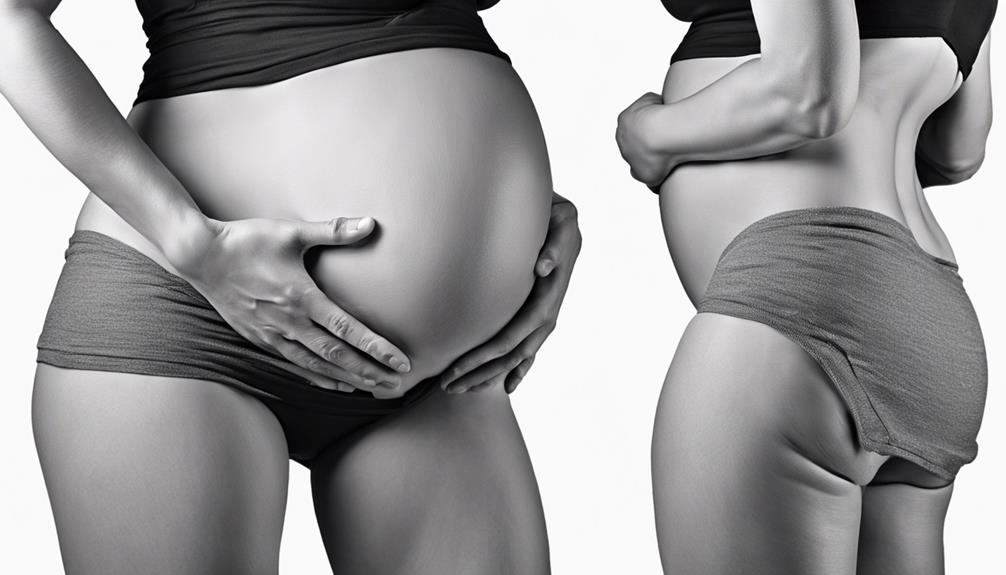During the tranquil early stages of pregnancy, apple cider vinegar can be a comforting companion to consider.
Its subtle tang and whispered promises of health benefits may entice curious minds seeking natural remedies.
However, amidst this allure, a cautious whisper lingers, reminding us of the importance of seeking guidance and understanding the nuances of incorporating ACV into our routines during this delicate period.
Let's explore the nuanced dance between potential benefits and prudent considerations to verify a harmonious journey ahead.
Key Takeaways
- Consult your healthcare provider before using ACV in the first trimester.
- Start with diluted organic ACV to potentially benefit from its properties.
- Prioritize safety by opting for pasteurized ACV with the 'mother'.
- Limit intake to 1-2 tablespoons daily to avoid potential risks.
Benefits of Apple Cider Vinegar in Pregnancy
Incorporating apple cider vinegar into your pregnancy routine can offer a range of benefits for expectant mothers.
During pregnancy, dealing with morning sickness can be challenging, but apple cider vinegar can help by neutralizing stomach acid and regulating blood sugar levels.
Additionally, the potassium found in apple cider vinegar may assist in preventing pregnancy leg cramps, providing relief and comfort.
For digestive issues like constipation, ACV can stimulate stomach acid production, aiding in digestion and promoting regular bowel movements.
Moreover, apple cider vinegar's anti-inflammatory properties can help reduce swelling and joint pain that often accompany pregnancy.
Boosting immune system function is important during pregnancy, and ACV can contribute to this by fighting off harmful bacteria and viruses.
Safety of Apple Cider Vinegar Consumption

Limited research exists on the safety of consuming apple cider vinegar (ACV) during pregnancy, emphasizing the importance of cautious consideration before including it in your diet.
When it comes to pregnancy, it's generally recommended to opt for pasteurized ACV as it's considered safe for consumption. However, unpasteurized ACV should be avoided due to potential harmful bacteria risks that could pose a threat to the health of both you and your baby.
Excessive intake of ACV may lead to heartburn and lower potassium levels, which are factors to be mindful of during pregnancy. It's advisable to consult a healthcare provider before incorporating ACV into your diet while pregnant, to ensure it aligns with your specific health needs.
Prioritizing safety and seeking professional guidance can help you make informed decisions regarding the use of apple cider vinegar during this important time.
Incorporating Apple Cider Vinegar Safely
To safely introduce apple cider vinegar into your diet during the first trimester of pregnancy, consider starting with small amounts of diluted ACV in water to assess your tolerance. It's vital to consult with your healthcare provider before incorporating apple cider vinegar to make sure it is safe for both you and your baby. Opt for organic, raw, unfiltered apple cider vinegar containing the 'mother' for added nutrients and potential health benefits. Limit your consumption to 1-2 tablespoons per day to avoid any potential side effects, and monitor your body's reactions closely. Be cautious of unpasteurized apple cider vinegar due to the risk of harmful bacteria, especially during the sensitive first trimester of pregnancy.
| Dos and Don'ts | |
|---|---|
| Do | Don't |
| Dilute ACV in water | Consume unpasteurized ACV |
| Consult healthcare provider | Exceed 1-2 tablespoons daily |
| Choose organic, unfiltered ACV | Overlook body reactions |
| Monitor reactions closely | Neglect safety precautions |
Choosing High-Quality Apple Cider Vinegar

When selecting apple cider vinegar for consumption during the first trimester of pregnancy, prioritize organic, raw, unfiltered options with the 'mother' substance for best nutrient content and potential health benefits. It's crucial to choose high-quality apple cider vinegar to guarantee both your well-being and that of your developing baby.
Here are some key points to bear in mind when selecting the right apple cider vinegar:
- Opt for organic ACV to avoid pesticides and chemicals.
- Choose raw and unfiltered ACV to retain beneficial enzymes and probiotics.
- Look for the presence of the 'mother' substance in the ACV, which signifies quality.
- If opting for pasteurized ACV, make sure it's clear and refined for safety.
- Check for any signs of harmful bacteria to prevent any potential risks during pregnancy.
Potential Risks and Side Effects
Excessive consumption of apple cider vinegar (ACV) during pregnancy can result in heartburn and digestive issues, posing potential risks to the well-being of both the mother and the developing fetus. The acidic nature of ACV may lead to throat and stomach irritation, especially if not properly diluted. It is important to avoid unpasteurized ACV in the first trimester to prevent foodborne illnesses caused by harmful bacteria. Additionally, overconsumption of ACV can lower potassium levels in the body, potentially affecting both the mother and the fetus. Another side effect to be mindful of is tooth enamel erosion, which may occur with the frequent intake of large amounts of ACV. To better illustrate the risks and side effects of excessive ACV consumption during pregnancy, refer to the table below:
| Potential Risks and Side Effects |
|---|
| Heartburn |
| Digestive Issues |
| Throat Irritation |
Conclusion
To sum up, while incorporating apple cider vinegar into your diet during the first trimester of pregnancy can offer potential health benefits, it's important to do so safely and under the guidance of healthcare professionals.
Despite any concerns about the taste or smell of ACV, its benefits for both mother and baby make it worth considering. Remember to consult with your doctor before starting any new regimen to make sure the well-being of you and your little one.









